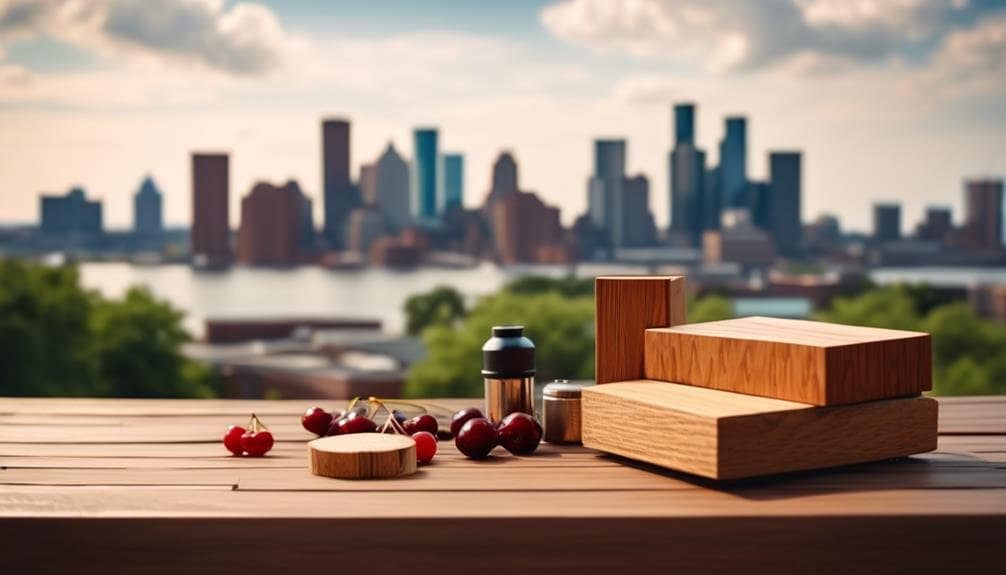Choosing the Right Wood for Detroit's Climate
Selecting the right wood for Detroit's climate is essential for its durability and performance. Detroit experiences fluctuating temperatures and varying humidity levels throughout the year, making it crucial to choose wood that can endure these conditions.
But how do you determine the best wood for Detroit's climate? Let's explore the characteristics and treatments that make certain types of wood more suitable than others and understand how these choices can impact your projects in the Motor City.
It's important to consider the impact of Detroit's climate on wood durability and performance. With the city's varying weather conditions, selecting wood that can withstand these fluctuations is vital. Understanding the specific properties of different types of wood and their ability to resist warping, rotting, or cracking in Detroit's climate is crucial for successful projects.
For example, cedar and redwood are known for their natural resistance to decay and insect damage, making them favorable choices for outdoor projects in Detroit.
Key Takeaways
Choosing the right wood for Detroit's climate is crucial for ensuring its durability and performance. Detroit's fluctuating temperatures and varying humidity levels throughout the year make it essential to select wood that can withstand these conditions.
Determining the best wood for Detroit's climate involves considering the specific properties of different types of wood and their ability to resist warping, rotting, or cracking. With the city's varying weather conditions, selecting wood that can endure these fluctuations is vital for successful projects in the Motor City.
For outdoor projects in Detroit, cedar and redwood are favorable choices due to their natural resistance to decay and insect damage. These types of wood can withstand the challenges posed by Detroit's climate, making them suitable options for various woodworking projects in the city.
Detroit's Climate Considerations
Considering Detroit's climate, it's important to prioritize wood with closed grains to resist moisture effectively, especially during the city's hot summers and cold winters. Urban trees like maple and birch, known for their closed grain, make them suitable choices for Detroit's cold winters, providing enhanced durability against moisture.
The harsh climate of Detroit demands resilient materials, and selecting wood with closed grains ensures it can withstand the extreme temperature variations experienced throughout the year. Cold winters can pose a significant challenge to wood, leading to issues like dryness, cracking, and splitting.
Choosing the right wood, such as those with densely-packed grains, is crucial to combat these effects and ensure the longevity of urban tree wood in this environment. It's imperative to consider the specific needs of Detroit's climate, and selecting the appropriate wood is a practical and technical solution to ensure the durability and reliability of wood products in the face of the city's challenging weather conditions.
Durability and Beauty Requirements
When choosing wood for Detroit's climate, it's important to prioritize materials that can withstand moisture and temperature extremes while also adding an aesthetic appeal. In this urban environment with fluctuating temperatures, it's essential to select wood with closed grains that can adapt to these conditions. Densely-grained wood is recommended for furniture and flooring as it can better withstand temperature fluctuations. Consider exotic woods like Sapgum and tulipwood which are suitable for Detroit's short winters and long summers, offering both durability and beauty. Additionally, prioritize hardwood for high-traffic areas such as flooring to ensure longevity and minimal wear and tear. It's advisable to treat the wood for extra protection, even if it's naturally resilient to Detroit's specific climate. The table below provides a summary of key wood types and their suitability for Detroit's climate.
| Wood Type | Characteristics |
|---|---|
| Densely-Grained Wood | Adaptable to extreme temperatures |
| Exotic Woods | Suitable for short winters and long summers |
| Hardwood | Ideal for high-traffic areas |
| Treated Wood | Enhanced protection |
Best Wood Types for Detroit
Ideal Wood Types for Detroit
When selecting wood types for Detroit's climate, it's essential to consider both durability and aesthetic appeal.
For the hot summers in Detroit, Sapgum and tulipwood are recommended due to their ability to withstand high temperatures.
Conversely, for the cold, dry winters in Michigan, woods like maple and birch with closed grains are suggested for added resilience to moisture.
Additionally, exotic woods such as Jarrah, Ebony, Katalox, Chakte Viga, Cocobolo, Purpleheart, and Honduras mahogany are popular choices, each with unique characteristics suitable for different applications in Detroit's climate.
It's important to assess their closed versus open-grain nature, hardness, and their ability to withstand extreme temperatures when considering exotic woods for Detroit's climate.
Seeking expert advice for the right wood type is highly recommended.
Protecting wood from the effects of humidity and dryness during Detroit's summers and winters is crucial, and companies like Door Renew Detroit offer services to refinish and restore wood doors to ensure their longevity and functionality in the diverse climate of Detroit.
Adaptable Wood Choices
Choosing the right wood for different regions requires considering adaptability to specific climate conditions. In urban areas like Detroit, it's important to select woods that can withstand temperature fluctuations, air pollution, and high levels of human activity. Look for species with a straight grain as these are more stable and less prone to warping. Also, consider the density of the wood, as denser woods are often more resilient in fluctuating climates.
In Detroit's climate, where winters can be harsh and summers hot and humid, suitable wood choices include red oak, hard maple, and cherry. These woods can withstand fluctuations in humidity and temperature, making them suitable for urban environments like Detroit.
Understanding the adaptability of different wood types to specific climate conditions is essential for ensuring the longevity and performance of wood products in urban settings.
Recommended Wood Species
Wood Species Recommendations for Detroit's Climate
When choosing wood species for Detroit's climate, it's important to select the right ones for the specific regions within the United States. This includes the northern, southern, and Pacific Northwest areas.
For the northern region, maple and birch are good choices because they can withstand the cold temperatures and harsh winters.
In the southern region, sapgum and tulipwood are recommended because they can thrive in the warmer climate and resist potential moisture-related issues.
For the Pacific Northwest, red alder and big-leaf maple are favorable choices due to their resilience to the region's unique combination of rain and moderate temperatures.
When selecting wood species for Detroit's climate, consider factors such as the type of grain, hardness, and resistance to extreme temperatures. It's also important to treat the wood for extra protection and to consult with experts. Additionally, consider the specific application of the wood, such as slabs purchased for live edge projects.
Frequently Asked Questions
What Wood Is Least Affected by Humidity?
Certain types of wood, such as maple and birch, are less affected by humidity due to their dense grain structure. This makes them particularly suitable for regions with short summers and long winters, such as the Northern region. These woods are less prone to warping or swelling in response to changes in humidity, making them a practical choice for construction and furniture in such areas. Their resilience to humidity can ensure the longevity and durability of wooden structures, making them a valuable option for various applications.
Which Wood Is Most Weather Resistant?
For maximum resistance to weather, choose wood with dense grain and high hardness. Consider using maple, birch, or sapgum for Detroit's climate. It's important to consult experts to find the right wood for your project and climate, ensuring long-lasting results. Additionally, using specific examples and product recommendations as needed can help you make an informed decision. By following these guidelines, you can ensure that your wood choice is suitable for the weather conditions in Detroit.
What Is the Best Wood for Hot Dry Climate?
In a hot, dry climate, teak is the best wood choice due to its natural oils and dense grain, which provide high resistance to moisture and rot. This makes it a reliable option for protecting wood in harsh climates. Teak's durability in such conditions makes it a top recommendation for outdoor furniture, decking, and other outdoor wood structures. Its long-lasting properties and low maintenance needs make it an ideal choice for areas with extreme weather. Additionally, teak's natural beauty and warm tones make it a popular choice for outdoor aesthetics.
Which Type of Wood Expands the Least?
For minimal expansion, opt for closed-grain hardwoods like maple or birch. These types of wood are more resilient to moisture and are well-suited for areas with short summers and long winters. It's important to consider the specific climate needs of your region, and consulting experts can provide valuable guidance.






